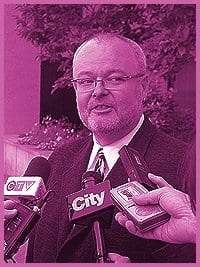It was a decision that shocked the community – and one that has implications for what politicians can say about the police.
“It’s a disgrace that the police gets to intimidate public officials,” says University Of Toronto law professor Marianna Valverde. Last week a six-person jury decided that Toronto City Councillor Kyle Rae must pay $170,000 in damages to the seven police officers involved in the Pussy Palace raid, as well as their legal bills, for calling them “goons,” “rogues” and “cowboys.”
Of that amount, $50,000 goes to Dave Wilson, the officer who led the raid – ruled unconstitutional in February – and who was the only officer named by Rae. The jury awarded $20,000 each to the six other officers: Peter Christie, Rich Petrie, Myron Demkiw, Chris LaFrance, Janet Hall and Adrian Greenaway. Rae shook their hands and said he was sorry after the verdict was delivered. The city will pay the damages out of its $2-million insurance fund.
The officers claimed that Rae’s comments damaged their career prospects and their personal lives, and led to many of them being transferred from 52 Division, or being unable to receive promotion. The jury found that Rae’s comments in his press release applied to all the officers, not just the men, a decision they reached despite Rae’s testimony that at the time his press release was issued, he was unaware of the undercover female officers in the Pussy Palace. The jury decided his words had malicious intent against all the parties.
Libel cases are rare, says Valverde, and those that make it to court don’t usually have juries. As this case was political, not economic, and required a particular knowledge of the role of a city councillor and a police officer, Valverde says there was “no point in having a jury.”
Valverde says Rae’s statements were “perfectly within the bounds of debate – a legitimate comment on policing matters.” The implications of the case are frightening. The decision “underscores the need to work on police accountability – will they sue the black activists who complain about police racism?”
After Madame Justice Jean MacFarland handed down the decision, Michael Freeman, the lawyer for the officers, called it “a great case for the voice of the silent majority.” The implication of this ruling is that opinions must be made “in a responsible manner.”
Rae said he was disappointed, but will live with the decision.
“I will be more careful in the future,” he said outside the courthouse. “Free speech isn’t dead, but temperate speech needs to come to the forefront.”
When asked if he would step down, Rae said voters “will have a ballot box to respond to in a year and a half.”
The verdict was particularly surprising after Justice MacFarland’s charge to the jury. Of Rae’s comments, she told them, “You would be hard-pressed to find recklessness in the circumstances of this case.”
Justice MacFarland called the officers’ claims for economic damage “flimsy.” No pay slips or income tax returns were used as evidence, and the time periods named for future damages were, she said, unrealistic. Their claims were “entirely speculative and without foundation.”
(Justice MacFarland’s past decisions include the Judge Walter Hryciuk case, where removed from the bench after sexually propositioning women in his chambers and the Jane Doe rape case, where a woman took the police to court for not issuing a warning that there was a rapist in the Annex area; MacFarland ruled against the police.)
The judge’s charge came the day after the jury heard the lawyers’ closing arguments. Rae’s lawyer, John David Holding, told the jury that “no one, no one at all, including Kyle Rae, has ever criticized the female officers.”
Holding criticized the stubbornness of the officers. Despite the court decision by Justice Peter Hryn – who said that the police behaviour the night of the raid brought the justice system into disrepute – and widespread criticism of their actions, Holding said they “still insist that they did nothing wrong – they said they would do it again today.”
In his argument, Freeman warned the jury not to be “fooled” by Rae’s calm demeanour, referring to parts of his testimony where “under pressure, [Rae] was angry, and he was clearly concerned about his image.”
Freeman argued that Rae used the Pussy Palace incident to “enhance his own reputation” and gain the support of the gay and lesbian community leading up to the municipal elections.
In his testimony, Rae called the Pussy Palace raid “a violation of privacy, a violation of rights.” Rae said he did not mean to offend the police officers themselves, but was “concerned about their actions.” He said he didn’t apologize to the officers prior to the trial, because it would seem to “condone what happened that night.”
Rae said he is not planning to appeal.

 Why you can trust Xtra
Why you can trust Xtra


